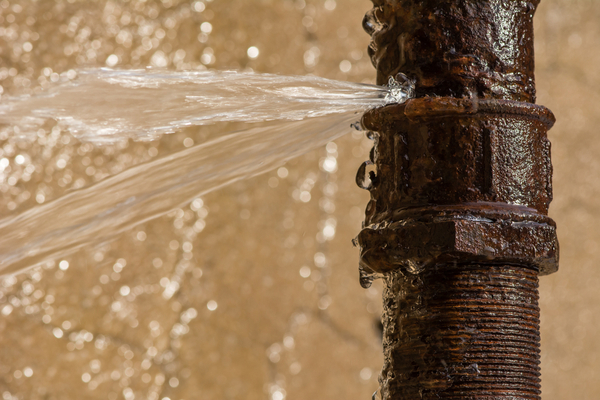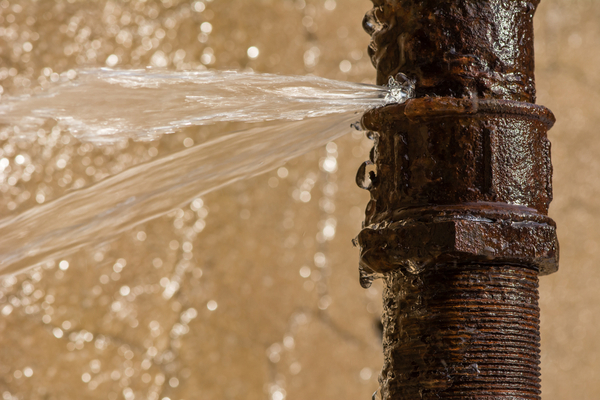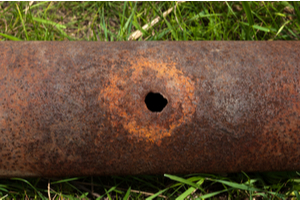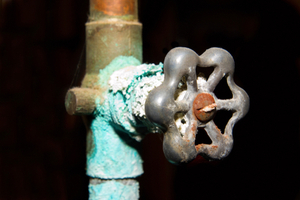
How Does Pipe Corrosion Work?
>
Pipes don’t last forever. Even copper pipes, despite their 50+ year lifespan, develop corrosion over time and in certain conditions. How does pipe corrosion affect your plumbing and your home’s water? And how do you prevent your pipes from corroding?
Corrosion affects different types of pipes in different ways. Cast iron pipe corrosion looks different than galvanized pipe corrosion and it can be caused by several factors. The bottom line: we want your plumbing and the water you drink to be safe.
What are the Causes of Pipe Corrosion?
Corrosion is an electrochemical electron exchange. This means the metal in your pipe loses electrons due to contact with another substance. This wear on a molecular level becomes bigger and bigger and eventually leads to rust, clogs or leaks.
Here are some of the more common causes of corrosion in metal pipes:
Low PH. A low PH (less than 7) indicates that your water is acidic. Acidic water can dissolve pipes from the inside and a common cause of copper pipe corrosion.High oxygen. A higher level of oxygen in your water can accelerate oxidation or rust. Unchecked rust that builds up over time will corrode and block your pipes.Water properties. High mineral content in hard water can cause calcification and lead to mineral buildup. Metals in water can cause galvanic corrosion where electrons transfer from metals with high electron count to metals with fewer electrons.Electrical currents. An ungrounded electrical current can travel down a copper pipe and stimulate a corrosive reaction.High velocity. Water traveling at a high velocity, especially hot water, can wear out your pipes prematurely.
How Does Pipe Corrosion Affect My Water?
Depending on the type of pipes you have, corrosion will affect your water in different ways. These effects can include:
DiscolorationTurbidity (cloudiness)Bitter tasteFoul odorHealth problems
Iron pipes will rust and eventually clog. The additional iron in your water can result in reddish colored water. While added iron doesn’t pose a health risk, the taste may be unappealing.
Copper pipes may produce blue colored water or water stains. This blue color indicates the presence of copper in your water due to corrosion. Too much copper can cause health problems that lead to liver or kidney damage. Luckily, the problem is visible well before it becomes a health risk.
Plastic and PVC pipes resist corrosion but because they are a newer material, there is not a lot of data on their long-term properties. The primary risk for corrosion is along joints and connectors where metal or rubber parts are used.
Lead pipes are extremely dangerous when corroded. Lead in water can cause serious health problems, especially in children. If you have lead plumbing anywhere in your home, have it replaced immediately and don’t drink your water.
How Does Pipe Corrosion Affect My Plumbing?
Water pipe corrosion inside your home can create numerous problems including:

Low water pressureLeaksPinholesBreaksRust stainsDamaged appliances
As your pipes corrode, they can develop small holes or cracks that eventually lead to large breaks and flooding. Interior corrosion can slow water pressure or clog your faucets and water heater. Rust might stain your sink.
If you’ve noticed lower water pressure, higher water bills and cloudy or discolored water, you probably have pipe corrosion somewhere in your home. Pipes can become thin or brittle without visual evidence.
How to Prevent Corroded Pipes
Have a certified plumber check your pipes to make sure they are safe and working properly. This is best way to be certain to be sure corrosion isn’t destroying your plumbing and to maintain healthy water in your home.
If your water is a problem, take a Langelier Saturation Index (LSI) test to determine what is causing the corrosion. The LSI test is a standard water quality test that measures:
PHConductivityTotal dissolved solidsAlkalinityHardness
*Note: The Langelier test does not identify lead in water. A separate, lead specific, test is required.
A water softener or water filter, hard wired into your water supply, can treat harsh water before it travels through your pipes. Use a water softener to remove excessive minerals that create buildup and make washing difficult. A water filter can remove chemicals and bacteria that accelerate corrosion. It will also remove make your water taste better!
How to Clean External Copper Pipe Corrosion
Copper pipe green corrosion is the result of oxidation. This patina is similar to rust in other types of pipes. Over time, this type of corrosion can lead to bigger issues.

To clean your copper pipes, you can use one of two methods:
A commercial metal polish designated for copper.A paste of white vinegar, salt and flour.
Follow the package instructions if using the commercial polish. To use the natural paste, brush it on to the affected areas and wait for ten minutes. The acid in the vinegar should loosen the alkali stains. Wipe away with a clean cloth. Repeat as necessary.
Repair or Replace Your Corroded Pipes
Don’t wait for rust colored water and damaged walls to let you know you have a significant plumbing issue. While pipe replacement can be a big job, the alternative can be much worse. Call or contact Mike Diamond today for a certified technician to examine your pipes for corrosion. We can help you decide the best course of action when corroded pipes compromise your water.
The post How Does Pipe Corrosion Work? appeared first on Mike Diamond Services.
Did you miss our previous article…
https://plumber-tacoma.net/?p=406
